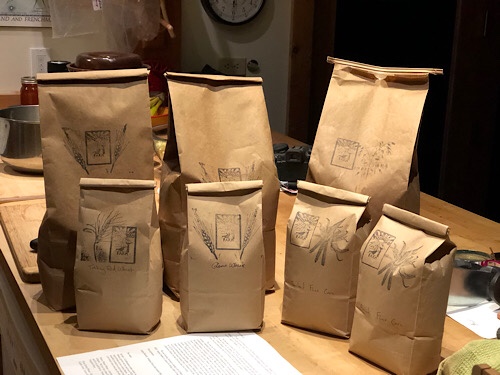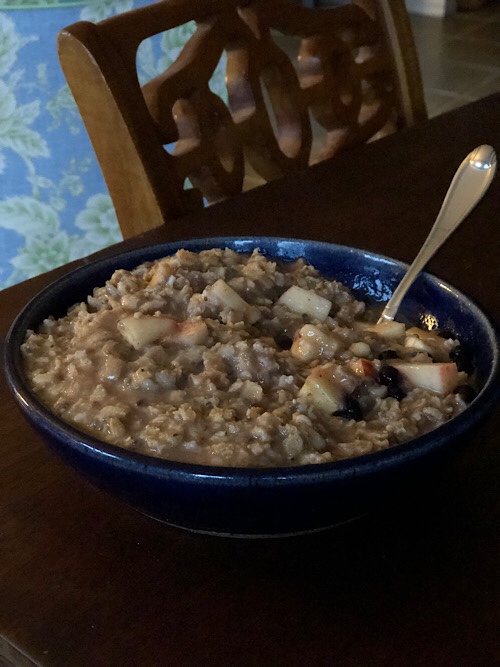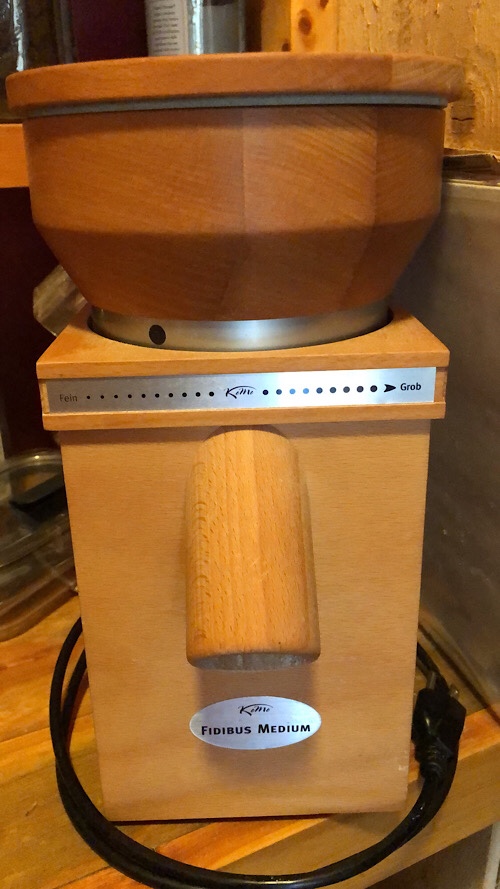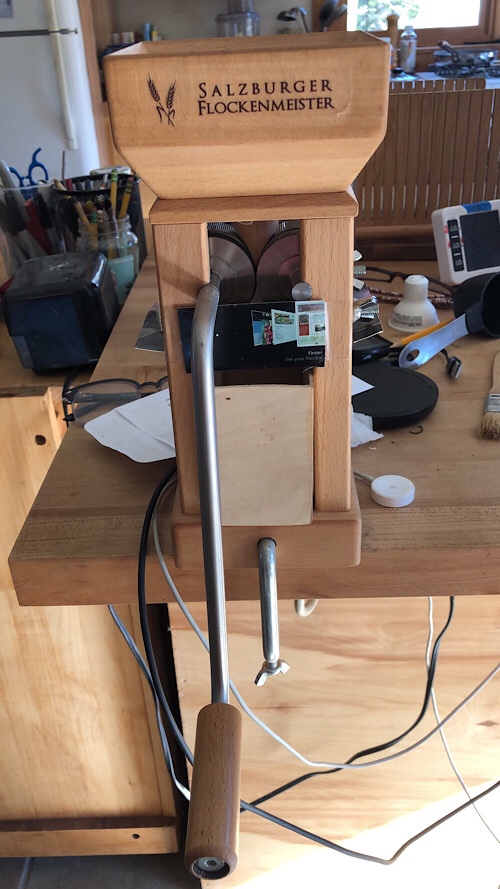This is very exciting – we received our first box in a grain share from Songbird Farm in Unity. Corn, wheat, oats, and rye. Points of excitement:
- I have rye berries again. I had to resort to rye flour for my sourdough starter because none of the stores I frequent carried rye berries.
- All locally grown!
- Songbird accommodated my request for “whole grain” so nicely. We have a home grindstone machine and an oatflaker and will put them to good use.
- These grains will be so fresh as we are milling them ourselves.
- All paper and cardboard packaging, no plastic!
- A nice flyer accompanied the order with a writeup about the origins of the grains and other farming news items.
- New projects seem accessible now. Particularly interested in cooking with more corn and learning nixtamalization.


The flyer’s content:
Hello Friends!
Thank you for being part of the Pantry Share CSA this year. Thank you for you enthusiasm baking with locally grown, direct sourced grains, and thank you for supporting our farm.I can’t tell you how much it means to us.
We decided to break the CSA into two seasonal pickups this year. This way you get to bake with fresher flour,we can spread our CSA workload out a little bit AND we all get to see one another twice. It feels strange to be packing smaller quantities of cornmeal and flour into a single box per share,but just remember that we’ll restock you later this winter.
The year has been another roller coaster growing season for us,replete with challenging weather, upended plans and mechanical breakdowns. In anticipation of launching a bakery with some collaborators,we doubled our grain acreage this spring. Unfortunately,the collaboration fell apart and the bakery dreams continues to elude us. But we are excited to grow on a bigger land-base and supply more of the grains for the Pantry Share and our other markets (we typically need to buy in a significant portion of the grain we mill from other Maine organic grain growers) The biggest CSA related challenge was our incredibly rainy month of July. We were unable to cultivate the muddy ground all month. Despite our early spring efforts using mechanical cultivation and hand weeding,the weeds completely overtook our dry bean crop in July, and we were forced to mow them. So sadly there are no beans in your share this pickup. We are planning to supply you with dry beans for the second pickup- we’re in communication with another organic Maine grower,who’s beans aren’t ready yet. Likewise, we will be buying more Somali Flint cornmeal from the Somali Bantu Community Association’s Liberation Farms for the CSA box later this winter.
We are looking forward to doing a lot of baking this winter and resting up for another season in 2022. Again,thanks so much for being a part of our farm.
Your growers,
Adam Nordell, Johanna Davis and Lauren McDonald
The share:
Sirvinta – A Lithuanian winter wheat variety variety brought as a seed packet to Maine by our friend Raivo Vihman, grown out by seed savor Will Bonsal,promoted by the Maine Grain Alliance, and now grown on a large acreage across central Maine. We were excited to grow this variety for the first time because it is beautiful, productive and winter hardy and because some of Adam’s family comes from a shtetl in Lithuania a few hours away from the Sirvinta River. Lightly sifted. Grown and milled by Songbird Farm
Turkey Winter Wheat – A heritage variety winter wheat brought to the US in the 1880s by Mennonite refugees. We love this wheat for its story, the way it moves in the wind with its tall stocks and long awns and for its mild flavor. Featured on the Slow Food Ark of Taste. Lightly sifted. Grown and milled by Songbird Farm
Glenn Spring Wheat – Glenn is a modern Spring bread wheat with good bread baking characteristics. Lightly sifted. Grown by Rusted Rooster Farm in Parkman, ME, milled by Songbird Farm
Rye Flour – A modern rye variety called Hazlett, this rye is incredibly winter hardy, moderately tall and very beautiful. We feed our sourdough started on rye flour and have enjoyed baking Jewish sourdough rye loaves like Adam’s dad makes, in nostalgia for the delis of 1950s Brooklyn. We aspire to learn to make the dense, European style loaves out of 100%rye flour, but haven’t ventured past 50% rye flour yet. Unsifted. Grown and milled by Songbird Farm
Rolled Oats – These are ‘hull-less’ oats, which thresh free of their hull like wheat and rye do, thus they don’t need to be processed in de-hulling equipment, which we don’t have. A small percentage of the hulls hang on to the oat groats -we’ve tried to eliminate these by seed cleaning the oats several times with a Clipper cleaner, but you will find some hulls in with the oats. I think we could eliminate these if we had easy access to a gravity table, a mysterious piece of seed cleaning equipment that sorts grain by forcing it to hover above a sheet of forced air on a side-slope. We don’t have a gravity table, and fortunately the hulls float on water. You can skim them off the surface when you mix the oats into a pot of water to make porridge. The hulls themselves are very soft when cooked, and shouldn’t be too much of a bother if you miss a few. We grew these oats on one of our new farm leases at the new Unity Agricultural Center on a hill above Unity College. The field looks out across Unity Pond to the western Maine mountains. It was an incredibly beautiful place to do field work, watching small spring rain storms move across the sunny central Maine landscape.Grown by Songbird Farm,rolled by Donny Webb of Webb Family Farm.
Scottish Style Cracked Oats – We have enjoyed learning a little bit about the deep culinary history of oats in Scotland, where they have been used to make porridge, cakes and various probiotic and alcoholic fermented beverages. Did you know that it is traditional to mix your oatmeal porridge with a carved wooden dowel called a spurtle? Our cracked oats once won us an invitation to appear on Martha Stewart’s PBS television show as oat experts. But the timing wasn’t good and also we are not oat experts. We are only oat enthusiasts. I do recommend reading the Wikipedia page about oats, though. Like the rolled oats, you will find a few hulls mixed in with this cereal. Whisk them off the surface of the water when you make your porridge. Grown and stone-milled by Songbird Farm
Abenaki Flint Cornmeal – Heritage variety featured on the Slow Food Ark of Taste and named for the western Abenaki Sokoki people who developed the variety in what is now Vermont. This corn is the last of our 2020 crop. We love Abenaki Flint for the window it has given us into Northeast Indigenous culture and Maine history, and for the way it has intertwined the broader community into our farm. We may continue growing Garland Flint over Abenaki Flint in future seasons, since we are able to mechanically harvest the fatter ears of the Garland Flint. We also switch varieties out of cultural deference to the eastern Abenaki people many of whom were displaced during the European settlement of what is now Maine. We have made donations of money and corn to several Native led non-profits and cultural revival projects, but haven’t yet found a long term way to pay cultural royalties for our cornmeal business. We are committed to working on this, regardless of which variety we grow. For now, a fond farewell and thank you to Abenaki Flint. Grown and milled by Songbird Farm.
Garland Flint Cornmeal – We got this seed from our grain growing mentor, Jack Lazor of Butterworks Farm in northern Vermont. Sadly, Jack passed away last year after a long battle with cancer, and after a life championing organic farming and small scale grain production. I believe that Jack told us that Garland is a historic cross between southern New England heritage varieties Longfellow Flint and another variety named for Wampanoag leader Matacom. (Look up the story of Matacom for an intense reflection on colonial New England history). Rob Johnston, the founder of Johnny’s Selected Seeds recently told us that he commercialized this variety after obtaining seeds from a farmer named George Garland in Massachusetts.He wasn’t certain about the parentage of Garland, but thinks that it is a traditional, northeast Native variety. We’re excited to keep digging into the history of Garland Flint. Grown and Milled by Songbird Farm
Updated to show machinery we use at home:

